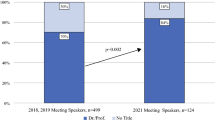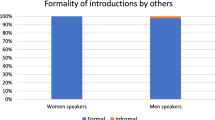Abstract
Background
Recent reviews of medical conferences have shown that women were less likely to receive a formal introduction compared with men. We examined speaker introductions at the Society of Surgical Oncology (SSO) annual meeting to determine whether similar biases exist within our organization.
Methods
An observational study of video-archived speaker introductions at the 2018 and 2019 SSO annual meetings was conducted. Professional address was defined as professional title followed by full name or last name. Multivariable logistic regression was used to identify factors associated with form of address.
Results
There were 499 speaker introductions reviewed. Speakers included 290 (58%) men and 238 (49%) post-graduate trainees (residents and fellows). A non-professional form of address was used to introduce 148 (30%) speakers and was most often used for post-graduate trainees (33%). Full professors were more likely than junior faculty to introduce speakers with a non-professional form of address (37% of full professors vs 18% of assistant professors, p < 0.001). In multivariable regression analysis these findings persisted. Trainees were 2.8 times more likely to receive a non-professional form of address (p = 0.003). Use of a non-professional introduction did not significantly vary by the speaker’s nor the introducer’s gender.
Conclusions
Residents and fellows were more likely to receive a non-professional form of address, and the likelihood of this increased with rising seniority of the introducer. The manner of speaker introduction did not vary by gender in our organization. More research is needed to explore the influence of these disparities on academic advancement for the next generation of surgical oncologists.


Similar content being viewed by others
References
Torres MB, Salles A, Cochran A. Recognizing and reacting to microaggressions in medicine and surgery. JAMA Surg. 2019;154(9), 868–872.
Files JA, Mayer AP, Ko MG, et al. Speaker introductions at internal medicine grand rounds: forms of address reveal gender bias. J Womens Health (Larchmt). 2017;26(5):413–419.
Duma N, Durani U, Woods CB, et al. Evaluating unconscious bias: speaker introductions at an international oncology conference. J Clin Oncol. 2019;37(36):3538–3545.
Jagsi R, Griffith MKA, Stewart A, Sambuco MD, DeCastro MR, Ubel PA. Gender differences in salary in a recent cohort of early-career physician-researchers. Acad Med J Assoc Am Med Col. 2013. https://doi.org/10.1097/acm.0b013e3182a71519.
Carnes M, Bland C. Viewpoint: a challenge to academic health centers and the National Institutes of Health to prevent unintended gender bias in the selection of clinical and translational science award leaders. Acad Med. 2007;82(2):202–206.
Average Full-time Faculty Promotions by Medical School, Rank, and Sex, Academic Years 2015–2016 Through 2018–2019. U.S. Medical School Faculty, Supplemental Tables web site. https://www.aamc.org/data-reports/faculty-institutions/interactive-data/2019-us-medical-school-faculty. Published 2019. Accessed 8 April 2020.
DiBrito SR, Lopez CM, Jones C, Mathur A. Reducing implicit bias: association of women surgeons #HeForShe task force best practice recommendations. J Am Coll Surg. 2019;228(3):303–309.
Thank you for Making SSO 2019 in San Diego a Success. Society of Surgical Oncology Annual Cancer Symposium web site. https://events.jspargo.com/sso19/public/enter.aspx. Published 2019. Accessed 21 April 2020.
ExpertEd@SSO. Virtual Conferences web site. https://experted.surgonc.org/Public/Catalog/Home.aspx?Criteria=110&tab=2. Published 2020. Accessed 1 August 2019.
SSO2019 Annual Cancer Symposium. https://eventmobi.com/sso2019/. Published 2019. Accessed 1 August 2019.
SSO2018 Annual Cancer Symposium. https://eventmobi.com/sso2018/. Published 2018. Accessed 1 August 2019.
Census Regions and Divisions of the United States. Reference Maps Web Site. https://www.census.gov/geographies/reference-maps/2010/geo/2010-census-regions-and-divisions-of-the-united-states.html. Published 2010. Accessed 23 April 2020.
About Race. The United States Census Bureau Web Site. https://www.census.gov/topics/population/race/about.html. Published 2020. Accessed 21 April 2020.
Dreachslin J, Weech-Maldonado R, Dansky KH. Racial and ethnic diversity and organizational behavior: a focused research agenda for health services management. Soc Sci Med. 2004;59:961–971.
Tan D, Mok T, Rebbeck TR. Cancer genomics: diversity and disparity across ethnicity and geography. J Clin Oncol. 2016;34(1):91–101.
Guerrero S, López-Cortés A, Indacochea A, et al. Analysis of racial/ethnic representation in select basic and applied cancer research studies. Sci Rep. 2018;8(1):13978.
Pariera KL, Murphy ST, Meng J, McLaughlin ML. Exploring willingness to participate in clinical trials by ethnicity. J Racial Ethn Health Dispar. 2017;4(4):763–769.
Davids JS, Lyu HG, Hoang CM, et al. Female representation and implicit gender bias at the 2017 American Society of colon and rectal surgeons’ annual scientific and tripartite meeting. Dis Colon Rectum. 2019;62(3):357–362.
Richardson JD. Workforce and lifestyle issues in general surgery training and practice. Arch Surg. 2002;137(5):515–520.
Durani U, Duma N, Slostad JA, et al. What’s in a name? A gender-based analysis of speaker introductions at the American Society of hematology annual meeting. In: American Society of Hematology, Washington, DC; 2019.
Baue AE. Politically correct discussions at surgical meetings. J Trauma. 2003;54(1):199–200.
Salles A, Awad M, Goldin L, et al. Estimating implicit and explicit gender bias among health care professionals and surgeons. JAMA Netw Open. 2019;2(7):e196545.
Table 13. Sex, Rank, Department. Faculty Roster: US Medical School Faculty 2019 Report. Web site. https://www.aamc.org/media/8441/download. Published 2019. Accessed 8 April 2020.
Chowdhary M, Chowdhary A, Royce TJ, et al. Women’s representation in leadership positions in academic medical oncology, radiation oncology, and surgical oncology programs. JAMA Netw Open. 2020;3(3):e200708–e200708.
Abelson JS, Symer MM, Yeo HL, et al. Surgical time out: our counts are still short on racial diversity in academic surgery. Am J Surg. 2018;215(4):542–548.
Lett LA, Orji WU, Sebro R. Declining racial and ethnic representation in clinical academic medicine: a longitudinal study of 16 US medical specialties. PLoS ONE. 2018;13(11):e0207274.
Silver JK, Slocum CS, Bank AM, et al. Where are the women? The underrepresentation of women physicians among recognition award recipients from medical specialty societies. PMR. 2017;9(8):804–815.
Lorenzo R, Voigt N, Tsusaka M, Krentz M, Abouzahr K. How diverse leadership teams boost innovation. https://www.bcg.com/en-us/publications/2018/how-diverse-leadership-teams-boost-innovation.aspx. Published 2018. Accessed 21 April 2020.
Freeman RB, Huang W. Collaborating with people like me: ethnic coauthorship within the United States. J Labor Econ. 2015;33(S1):S289–S318.
Asplund M, Welle CG. Advancing science: how bias holds us back. Neuron. 2018;99(4):635–639.
Acknowledgements
Dr. Susanne G. Warner is supported through the generosity of Natalie & David Roberts. The authors wish to thank them for their philanthropy. The authors would also like to thank Luke Stewart for assistance with creating the choropleth in Fig. 1.
Author information
Authors and Affiliations
Corresponding author
Ethics declarations
Disclosures
None of the authors have any commercial interests that are relevant to the findings of this manuscript. The following authors have disclosures: ND participates in consulting/advising for Astrazeneca and Inivata, Inc. SW is supported by the American Cancer Society Mentored Research Scholar Grant: MRSG-16-047-01-MPC, and by the generosity of the Natalie and David Roberts Family. The remaining authors have no disclosures.
Additional information
Publisher's Note
Springer Nature remains neutral with regard to jurisdictional claims in published maps and institutional affiliations.
Rights and permissions
About this article
Cite this article
Stewart, C.L., De Andrade, J.P., Duma, N. et al. Unconscious Bias in Speaker Introductions at a Surgical Oncology Meeting: Hierarchy Reigns Over Gender. Ann Surg Oncol 27, 3754–3761 (2020). https://doi.org/10.1245/s10434-020-08906-8
Received:
Accepted:
Published:
Issue Date:
DOI: https://doi.org/10.1245/s10434-020-08906-8




